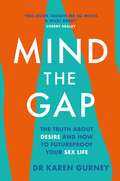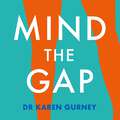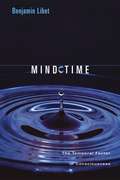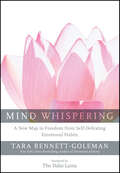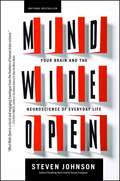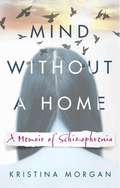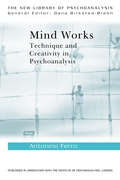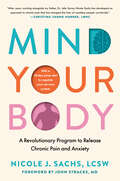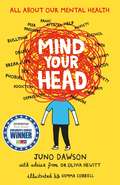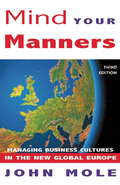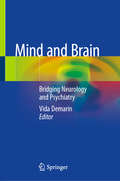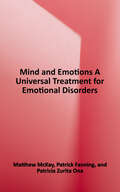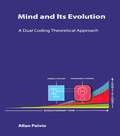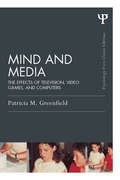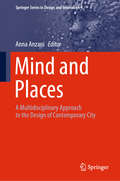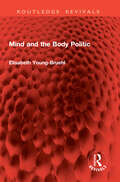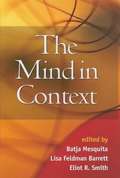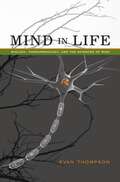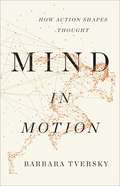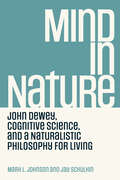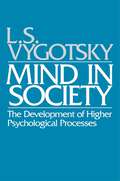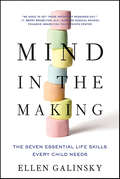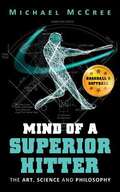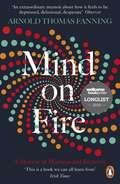- Table View
- List View
Mind The Gap: The truth about desire and how to futureproof your sex life
by Dr Karen Gurney'This book taught me so much about female desire. A must read!' Cherry HealeyDid you know that there is an orgasm gap of around 30% between heterosexual couples when they have sex? In Mind The Gap, Dr Karen Gurney, a clinical psychologist and certified psychosexologist, explores not just this gap, but the gaps in our knowledge of so much of the most important new science around sex and desire. In this book, you will learn that nearly everything that you've been led to believe about female sexuality isn't actually true. And that, despite what you might think, it is possible to simultaneously feel little to no spontaneous desire and have a happy and mutually satisfying sex life long term.Exploring the mismatch between ideas about sex in our society and what the science tells us, Mind The Gap also explains how this disconnect lies at the root of many of our sexual problems. Combining science with case studies, practical exercises and tips, this is a book for anyone who wants to better understand the mechanics of desire and futureproof their sex life, for life.
Mind The Gap: The truth about desire and how to futureproof your sex life
by Dr Karen GurneyDid you know that there is an orgasm gap of around 30% between heterosexual couples when they have sex? In Mind The Gap, Dr Karen Gurney, a clinical psychologist and certified psychosexologist, explores not just this gap, but the gaps in our knowledge of so much of the most important new science around sex and desire. In this audiobook, you will learn that nearly everything that you've been led to believe about female sexuality isn't actually true. And that, despite what you might think, it is possible to simultaneously feel little to no spontaneous desire and have a happy and mutually satisfying sex life long term.Exploring the mismatch between ideas about sex in our society and what the science tells us, Mind The Gap also explains how this disconnect lies at the root of many of our sexual problems. Combining science with case studies, practical exercises and tips, this is an audiobook for anyone who wants to better understand the mechanics of desire and futureproof their sex life, for life.(P)2020 Headline Publishing Group Ltd
Mind Time: The Temporal Factor in Consciousness (Perspectives in Cognitive Neuroscience)
by Benjamin LibetOur subjective inner life is what really matters to us as human beings--and yet we know relatively little about how it arises. Over a long and distinguished career Benjamin Libet has conducted experiments that have helped us see, in clear and concrete ways, how the brain produces conscious awareness. For the first time, Libet gives his own account of these experiments and their importance for our understanding of consciousness. Most notably, Libet's experiments reveal a substantial delay--the "mind time" of the title--before any awareness affects how we view our mental activities. If all conscious awarenesses are preceded by unconscious processes, as Libet observes, we are forced to conclude that unconscious processes initiate our conscious experiences. Freely voluntary acts are found to be initiated unconsciously before an awareness of wanting to act--a discovery with profound ramifications for our understanding of free will. How do the physical activities of billions of cerebral nerve cells give rise to an integrated conscious subjective awareness? How can the subjective mind affect or control voluntary actions? Libet considers these questions, as well as the implications of his discoveries for the nature of the soul, the identity of the person, and the relation of the non-physical subjective mind to the physical brain that produces it. Rendered in clear, accessible language, Libet's experiments and theories will allow interested amateurs and experts alike to share the experience of the extraordinary discoveries made in the practical study of consciousness.
Mind Whispering: A New Map to Freedom from Self-Defeating Emotional Habits
by Tara Bennett-GolemanBreak free of self-defeating habits with help from cognitive psychology, neuroscience & Eastern thought in this guide from a New York Times–bestselling author, featuring a foreword by the Dalai Lama.“An inspired and innovative look at the ways we can be tripped up by our habitual thinking…beautifully melding the teachings of Buddhism, horse whispering, and [Tara’s] own therapeutic practice.” —Bonnie Raitt, musician and activist“The road in life forks in every moment, with one path leading toward confusion, separateness, and entanglement, and the other toward clarity, connection, and mental freedom. With mind whispering, the choice can be ours.”—from Mind WhisperingWhy sometimes do even the smallest events send us into a downward spiral? Whether we’re aware of it or not, our feelings and outlook are constantly shaped by learned patterns, or habitual modes of being. These have the power to dictate our sense of wellbeing and our very perceptions of our lives and the world around us. These modes—distinct orchestrations of how we think and feel, how we act and interact—can open us up to delight and wisdom or preoccupy us with fear and despair, driving and distorting our experiences like invisible puppeteers of the mind.In this engaging and insightful work, New York Times–bestselling author Tara Bennett-Goleman offers us new ways to cut the strings of our self-defeating habits and find emotional freedom.By bringing together the latest in cognitive psychology, the neuroscience of habit change, Eastern philosophy, and her experience with horse whispering, Bennett-Goleman helps liberate us from our most challenging mental roadblocks so we can identify emotional triggers and dysfunctional habits in ourselves and our relationships and begin to build new positive patterns in our lives and our world.A groundbreaking map of the emotional mind, Mind Whispering helps transform our emotions, improve our relationships, connect us with a wise and compassionate heart, and finally live with a more lasting sense of happiness.“Mind Whispering furthers the dialogue of psychology east and west. She is truly a pioneer in the integration of Cognitive Therapy and mindfulness. This book is not only useful for clinicians, but for people in their everyday lives.” —Dr. Aaron Beck, founder of the Beck Institute for Cognitive Therapy“My dear friend Tara shares her wise and playful insights into why we are continually at the mercy of negative mind patterns and how, if we do the work, we can change them. Mind Whispering is like spending time with a sane and cherished friend, whose warmth and wisdom we can completely trust.” —Richard Gere, actor and activist
Mind Wide Open: Your Brain and the Neuroscience of Everyday Life
by Steven JohnsonBRILLIANTLY EXPLORING TODAY'S CUTTING-EDGE BRAIN RESEARCH, MIND WIDE OPEN IS AN UNPRECEDENTED JOURNEY INTO THE ESSENCE OF HUMAN PERSONALITY, ALLOWING R<P>EADERS TO UNDERSTAND THEMSELVES AND THE PEOPLE IN THEIR LIVES AS NEVER BEFORE. Using a mix of experiential reportage, personal storytelling, and fresh scientific discovery, Steven Johnson describes how the brain works -- its chemicals, structures, and subroutines -- and how these systems connect to the day-to-day realities of individual lives. For a hundred years, he says, many of us have assumed that the most powerful route to self-knowledge took the form of lying on a couch, talking about our childhoods. The possibility entertained in this book is that you can follow another path, in which learning about the brain's mechanics can widen one's self-awareness as powerfully as any therapy or meditation or drug. <P> In Mind Wide Open, Johnson embarks on this path as his own test subject, participating in a battery of attention tests, learning to control video games by altering his brain waves, scanning his own brain with a $2 million fMRI machine, all in search of a modern answer to the oldest of questions: who am I? <P> Along the way, Johnson explores how we "read" other people, how the brain processes frightening events (and how we might rid ourselves of the scars those memories leave), what the neurochemistry is behind love and sex, what it means that our brains are teeming with powerful chemicals closely related to recreational drugs, why music moves us to tears, and where our breakthrough ideas come from. <P> Johnson's clear, engaging explanation of the physical functions of the brain reveals not only the broad strokes of our aptitudes and fears, our skills and weaknesses and desires, but also the momentary brain phenomena that a whole human life comprises. Why, when hearing a tale of woe, do we sometimes smile inappropriately, even if we don't want to? Why are some of us so bad at remembering phone numbers but brilliant at recognizing faces? Why does depression make us feel stupid? <P> To read Mind Wide Open is to rethink family histories, individual fates, and the very nature of the self, and to see that brain science is now personally transformative -- a valuable tool for better relationships and better living.
Mind Without a Home: A Memoir of Schizophrenia
by Kristina MorganThis book brings readers straight inside the tortuous nature of the disease of schizophrenia, chronicled in short, journal-like chapters that narrate the author’s incredible story.Experience the inner world of a woman with schizophrenia in this brutally honest, lyrical memoir.Have you ever wondered what it is like in the mind of a person with schizophrenia? How can one survive day after day unable to distinguish between one's inner nightmares and the everyday realities that most of us take for granted?In her brutally honest, highly original memoir, Kristina Morgan takes us inside her head to experience the chaos, fragmented thinking, and the startling creativity of the schizophrenic mind. With the intimacy of private journal-like entries and the language of a poet, she carries us from her childhood to her teen years when hallucinations began to hijack her mind and into adulthood where she began abusing alcohol to temper the punishing voices that only she could hear.This is no formulaic tale of tragedy and triumph: We feel Kristina's hope as she pursues an education and career and begins to build strong family connections, friendships and intimacy-and her devastation as the insistent voices convince her to throw it all away, destroying herself and alienating everyone around her. Woven through the pages of her life are stories of recovery from alcoholism and the search for her sexual identity in relationships with both women and men. Eventually, her journey takes her to a place of relative peace and stability where she finds the inner resources and support system to manage her chronic illnesses and live a fulfilling life.
Mind Works: Technique and Creativity in Psychoanalysis (The New Library of Psychoanalysis)
by Antonino FerroIs the analyst's mind a factor in the analytic process? In Mind Works Antonino Ferro uses clinical material such as detailed reports of sessions, together with client's analytic histories, to develop Bion’s original findings and illustrate complex concepts in the field of psychoanalytic technique. These concepts include: interpretive modalities the end of analysis psychosomatic pathologies narcissism. Mind Works: Technique and Creativity in Psychoanalysis also suggests that dreaming is a fundamental moment in analytic work, and Ferro discusses how dreams can go beyond the present to become a continuous act of the mind in the waking state, allowing internal and external stimuli to be transformed into thoughts and emotions. Focusing on how the minds of the analyst and the analysand work in psychoanalysis, this book will appeal to psychoanalysts, psychotherapists, and psychiatrists and will be helpful in psychoanalytic and psychotherapeutic work on a day-to-day basis.
Mind Your Body: A Revolutionary Program to Release Chronic Pain and Anxiety
by Nicole J. Sachs LCSWLearn how to free yourself from chronic pain, anxiety, fatigue, and myriad debilitating conditions through the transformative process of nervous system regulation in this accessible guide from psychotherapist and leading Mindbody clinician Nicole Sachs.At a time when chronic pain and other conditions have reached epidemic proportions, and the medical model is coming up short for so many of us, Mind Your Body shares the evidence-based practices that can help deliver readers from hopelessness to freedom. Most people who come to Nicole Sachs have exhausted all other paths to cope with their chronic back and bodily pain, IBS, sciatica, pelvic pain, long COVID, migraines, fibromyalgia, nerve inflammation, skin conditions, anxiety and panic disorders, and many more health conditions. Maybe they&’re considering surgery or other interventions, with no real promise of a cure, or maybe the surgeries and treatments they&’ve already attempted have proved disappointing and they are desperate for relief.Sachs knows that these kinds of syndromes often don&’t originate from a physical source. Rather, they are fueled by trauma responses associated with deeply rooted psychological and emotional triggers that send the brain and the nervous system into fight or flight.In Mind Your Body, Sachs teaches readers about Mindbody medicine—which helped her overcome her own debilitating pain and dark prognosis. She explains the essential practice of turning inward, using her revolutionary JournalSpeak method, which has enabled countless people to achieve striking mental, emotional, and physical healing. Mind Your Body takes chronic pain recovery into its next stage, for a new generation of readers who have been so underserved by our medical system.
Mind Your Head
by Juno DawsonFrom the critically acclaimed author of THIS BOOK IS GAY, James Dawson, now writing as Juno DawsonFrom the critically acclaimed author of THIS BOOK IS GAY, James Dawson, now writing as Juno Dawson. We all have a mind, so we all need to take care of our mental health as much as we need to take care of our physical health. And the first step is being able to talk about our mental health. Juno Dawson leads the way with this frank, factual and funny book, with added information and support from clinical psychologist Dr Olivia Hewitt. Covering topics from anxiety and depression to addiction, self-harm and personality disorders, Juno and Olivia talk clearly and supportively about a range of issues facing young people's mental health - whether fleeting or long-term - and how to manage them. With real-life stories from young people around the world and witty illustrations from Gemma Correll.
Mind Your Manners
by John MoleUnderstanding the nature of cultural diversity is one thing-managing it day-to-day is quite another! When doing business internationally, culture shock-and sometimes culture clash-is unavoidable. John Mole's Mind Your Manners: Managing Business Cultures in the New Global Europe is a comprehensive guide that explores cultural aspects of dozens of individual European countries as they relate to global business. Now in a fully expanded and updated third edition, Mind Your Manners includes every countriy-from the Baltics to the Balkans-applying for membership to the European Union, the world's biggest global market, and many others.Based on interviews, surveys, and workshops with over a thousand managers (of fifty nationalities), Mind Your Manners describes Europe's extraordinary political, economic, and social changes and their effects on the way we work together. New chapters on diversity, change, body language, and negotiation identify the key elements that shape the business and cultural environment of the continent, and Euroquizzes will test your knowledge and demonstrate the broad cultural spectrum of European nations. More than a mere catalog, Mind Your Manners is a must-read for anyone who intends to succeed in the European Union.
Mind and Brain: Bridging Neurology and Psychiatry
by Vida DemarinThis book discusses the link between the brain and the mind. Adopting an evidence-based neuropsychiatry approach while also touching on philosophical aspects, it examines the association between diseases of the brain and mental health, offering comprehensive insights into the emerging new discipline of psychoneuroendocrinoimmunology and its translation to clinical practice. The book particularly focuses on brain plasticity and on explaining the ability of the brain to learn new pathways in everyday situations and at the same time improve creativity.Written by clinicians and leading experts in the field of brain physiology and pathology, this book is a valuable resource for medical professionals and postgraduate students.
Mind and Emotions: A Universal Treatment for Emotional Disorders
by Patrick Fanning Matthew McKay Patricia E. Zurita OnaWe all have our own ways of handling stressful situations without letting emotions get the best of us, but some ways of coping work better than others. Short-term fixes that help us avoid or numb our emotions may temporarily alleviate sadness and anger, but can also end up causing anxiety, depression, chronic anger, and even physical health problems. If you struggle with overwhelming emotions and feel trapped by unhealthy patterns, this workbook is your ticket out. Mind and Emotions is a revolutionary universal treatment program for all emotional disorders that helps you discover which of the seven problematic coping styles is keeping you trapped in a cycle of emotional pain. Instead of working on difficulties like anxiety, anger, shame, and depression one by one, you’ll treat the root of all your emotional suffering at once. Drawing on evidence-based skills from cognitive behavioral therapy, acceptance and commitment therapy, and dialectical behavior therapy, this workbook offers all the techniques you need to manage unwelcome feelings in effective and productive ways. Learn and practice the most effective coping skills.
Mind and Its Evolution: A Dual Coding Theoretical Approach
by Allan PaivioThis book updates the Dual Coding Theory of mind (DCT), a theory of modern human cognition consisting of separate but interconnected nonverbal and verbal systems. Allan Paivio, a leading scholar in cognitive psychology, presents this masterwork as new findings in psychological research on memory, thought, language, and other core areas have flourished, as have pioneering developments in the cognitive neurosciences. Mind and Its Evolution provides a thorough exploration into how these adaptive nonverbal and verbal systems might have evolved, as well as a careful comparison of DCT with contrasting "single-code" cognitive theories. Divided into four parts, this text begins with a general, systematic theory of modern human cognition as the reference model for interpreting the cognitive abilities of evolutionary ancestors. The first half of the book discusses mind as it is; the second half addresses how it came to be that way. Each half is subdivided into two parts defined by thematic chapters. Mind and Its Evolution concludes with evidence-based suggestions about nourishing mental growth through applications of DCT in education, psychotherapy, and health. This volume will appeal to cognitive and evolutionary psychologists, as well as students in the areas of memory, language, cognition, and mind evolution specialists in psychology, philosophy, and other disciplines.
Mind and Its Evolution: A Dual Coding Theoretical Approach
by Allan PaivioThis book updates the Dual Coding Theory of mind (DCT), a theory of modern human cognition consisting of separate but interconnected nonverbal and verbal systems. Allan Paivio, a leading scholar in cognitive psychology, presents this masterwork as new findings in psychological research on memory, thought, language, and other core areas have flourished, as have pioneering developments in the cognitive neurosciences. Mind and Its Evolution provides a thorough exploration into how these adaptive nonverbal and verbal systems might have evolved, as well as a careful comparison of DCT with contrasting "single-code" cognitive theories. Divided into four parts, this text begins with a general, systematic theory of modern human cognition as the reference model for interpreting the cognitive abilities of evolutionary ancestors. The first half of the book discusses mind as it is; the second half addresses how it came to be that way. Each half is subdivided into two parts defined by thematic chapters. Mind and Its Evolution concludes with evidence-based suggestions about nourishing mental growth through applications of DCT in education, psychotherapy, and health. This volume will appeal to cognitive and evolutionary psychologists, as well as students in the areas of memory, language, cognition, and mind evolution specialists in psychology, philosophy, and other disciplines.
Mind and Media: The Effects of Television, Video Games, and Computers (Psychology Press & Routledge Classic Editions)
by Patricia M. GreenfieldPatricia M. Greenfield was one of the first psychologists to present new research on how various media can be used to promote social growth and thinking skills. In this now classic, she argues that each medium can make a contribution to development, that each has strengths and weaknesses, and that the ideal childhood environment includes a multimedia approach to learning. In the Introduction to the Classic Edition, Greenfield shows how the original edition set themes that have extended into contemporary research on media and child development, and includes an explanation of how the new media landscape has changed her own research and thinking.
Mind and Places: A Multidisciplinary Approach to the Design of Contemporary City (Springer Series in Design and Innovation #4)
by Anna AnzaniThis book explores the contributions of psychological, neuroscientific and philosophical perspectives to the design of contemporary cities. Pursuing an innovative and multidisciplinary approach, it addresses the need to re-launch knowledge and creativity as major cultural and institutional bases of human communities. Dwelling is a form of knowledge and re-invention of reality that involves both the tangible dimension of physical places and their mental representation. Findings in the neuroscientific field are increasingly opening stimulating perspectives on the design of spaces, and highlight how our ability to understand other people is strongly related to our corporeity. The first part of the book focuses on the contributions of various disciplines that deal with the spatial dimension, and explores the dovetailing roles that science and art can play from a multidisciplinary perspective. In turn, the second part formulates proposals on how to promote greater integration between the aesthetic and cultural dimension in spatial design. Given its scope, the book will benefit all scholars, academics and practitioners who are involved in the process of planning, designing and building places, and will foster an international exchange of research, case studies, and theoretical reflections to confront the challenges of designing conscious places and enable the development of communities.
Mind and the Body Politic (Routledge Revivals)
by Elisabeth Young-BruehlFirst published in 1989, Mind and the Body Politic is a collection of Elisabeth Young-Bruehl’s twelve essays and lectures on political theory, psychoanalysis, feminism, and the theory of biography. It is a must read for students and researchers of political philosophy, psychology, and sociology.
Mind in Context
by Lisa Barrett Batja MesquitaMost psychology research still assumes that mental processes are internal to the person, waiting to be expressed or activated. This compelling book illustrates that a new paradigm is forming in which contextual factors are considered central to the workings of the mind. Leading experts explore how psychological processes emerge from the transactions of individuals with their physical, social, and cultural environments. The volume showcases cutting-edge research on the contextual nature of such phenomena as gene expression, brain networks, the regulation of hormones, perception, cognition, personality, knowing, learning, and emotion.
Mind in Life: Biology, Phenomenology, and the Sciences of Mind
by Evan ThompsonHow is life related to the mind? Thompson explores this so-called explanatory gap between biological life and consciousness, drawing on sources as diverse as molecular biology, evolutionary theory, artificial life, complex systems theory, neuroscience, psychology, Continental Phenomenology, and analytic philosophy. Ultimately he shows that mind and life are more continuous than previously accepted, and that current explanations do not adequately address the myriad facets of the biology and phenomenology of mind.
Mind in Motion: How Action Shapes Thought
by Barbara TverskyAn eminent psychologist offers a major new theory of human cognition: movement, not language, is the foundation of thoughtWhen we try to think about how we think, we can't help but think of words. Indeed, some have called language the stuff of thought. But pictures are remembered far better than words, and describing faces, scenes, and events defies words. Anytime you take a shortcut or play chess or basketball or rearrange your furniture in your mind, you've done something remarkable: abstract thinking without words. In Mind in Motion, psychologist Barbara Tversky shows that spatial cognition isn't just a peripheral aspect of thought, but its very foundation, enabling us to draw meaning from our bodies and their actions in the world. Our actions in real space get turned into mental actions on thought, often spouting spontaneously from our bodies as gestures. Spatial thinking underlies creating and using maps, assembling furniture, devising football strategies, designing airports, understanding the flow of people, traffic, water, and ideas. Spatial thinking even underlies the structure and meaning of language: why we say we push ideas forward or tear them apart, why we're feeling up or have grown far apart. Like Thinking, Fast and Slow before it, Mind in Motion gives us a new way to think about how--and where--thinking takes place.
Mind in Nature: John Dewey, Cognitive Science, and a Naturalistic Philosophy for Living
by Jay Schulkin Mark L. JohnsonA dialogue between contemporary neuroscience and John Dewey&’s seminal philosophical work Experience and Nature, exploring how the bodily roots of human meaning, selfhood, and values provide wisdom for living.The intersection of cognitive science and pragmatist philosophy reveals the bodily basis of human meaning, thought, selfhood, and values. John Dewey's revolutionary account of pragmatist philosophy Experience and Nature (1925) explores humans as complex social animals, developing through ongoing engagement with their physical, interpersonal, and cultural environments. Drawing on recent research in biology and neuroscience that supports, extends, and, on occasion, reformulates some of Dewey's seminal insights, embodied cognition expert Mark L. Johnson and behavioral neuroscientist Jay Schulkin develop the most expansive intertwining of Dewey's philosophy with biology and neuroscience to date.The result is a positive, life-affirming understanding of how our evolutionary and individual development shapes who we are, what we can know, where our deepest values come from, and how we can cultivate wisdom for a meaningful and intelligent life.
Mind in Society: The Development of Higher Psychological Processes
by Michael Cole Sylvia Scribner Ellen Souberman L. S. Vygotsky Vera Joh-SteinerThe great Russian psychologist L. S. Vygotsky has long been recognized as a pioneer in developmental psychology. But his theory of development has never been well understood in the West. Mind in Society corrects much of this misunderstanding. Carefully edited by a group of outstanding Vygotsky scholars, the book presents a unique selection of Vygotsky's important essays.
Mind in the Making: The Seven Essential Life Skills Every Child Needs
by Ellen Galinsky“Ellen Galinsky—already the go-to person on interaction between families and the workplace—draws on fresh research to explain what we ought to be teaching our children. This is must-reading for everyone who cares about America’s fate in the 21st century.” — Judy Woodruff, Senior Correspondent for The PBS NewsHour Families and Work Institute President Ellen Galinsky (Ask the Children, The Six Stages of Parenthood) presents a book of groundbreaking advice based on the latest research on child development.
Mind of a Superior Hitter: The Art, Science and Philosophy
by Michael McCreeThis book takes an in-depth look into the key aspects of becoming a great hitter from a psychological, emotional and strategic perspective. It is designed to enhance the intelligence of hitters in both baseball and softball on a level that is unprecedented. It also includes quotes and advice from some of the top hitting coaches in the world, former professional players and prominent minds that have contributed to today's leading hitting ideologies. Throughout, players and coaches are provided valuable information on what it takes to become a better all-around hitter.
Mind on Fire: Shortlisted for the Wellcome Book Prize 2019
by Arnold Thomas FanningShortlisted for the Wellcome Book Prize 2019'[A] painfully intense, courageous and gripping account of [Fanning's] journey to the underworld of madness and back. This is a brave and instructive book.' Irish Times'Extraordinary. An account of mental illness, grief, delusions, homelessness, a fractured family relationship ... and all while trying to recover and create. Superb writing on a frequently difficult subject.' Sinéad Gleeson Arnold Thomas Fanning had his first experience of depression during adolescence, following the death of his mother. Some ten years later, an up-and-coming playwright, he was overcome by mania and delusions. Thus began a terrible period in which he was often suicidal, increasingly disconnected from family and friends, sometimes in trouble with the law, and homeless in London.Drawing on his own memories, the recollections of people who knew him when he was at his worst, and medical and police records, Arnold Thomas Fanning has produced a beautifully written, devastatingly intense account of madness - and recovery, to the point where he has not had any serious illness for over a decade and has become an acclaimed playwright. Fanning conveys the consciousness of a person living with mania, psychosis and severe depression with a startling precision and intimacy. Mind on Fire is the gripping, sometimes harrowing, and ultimately uplifting testament of a person who has visited hellish regions of the mind.'Arnold Thomas Fanning offers the most vivid and unflinching window into the mind of someone who is in the throes of madness ... It was like nothing I'd read before' Rick Edwards'Mind on Fire is a truly powerful, arresting, haunting account. Arnold Thomas Fanning has reckoned with the darkest matter of his heart and mind, and I challenge anyone not to be moved by that.' Sara Baume, author of Spill Simmer Falter Wither and A Line Made by Walking'In this strange and singular book, Arnold Thomas Fanning mercilessly excavates the infernal underworld of his own years of madness. As reminiscent as it occasionally is of John Healy's The Grass Arena, and even of Orwell's Down and Out in Paris and London, the book is ultimately not quite like anything else I've read, and brought me as close to the lived reality of mental illness as I have ever been. It's a significant achievement: a painful, inexorable work of autobiography, whose existence is its own form of redemption.' Mark O'Connell, Baillie Gifford Prize-shortlisted author of To Be a Machine'This is an extraordinary memoir about how it feels to be depressed, delusional, desperate' The Observer 'Incredibly important' Emilie Pine, author of Notes to Self'A ratcheting pace, a tight first-person immediacy, and utterly staggering to be a passenger over its entire warped course ... An indelible, ground-shaking account' Hilary A White, Irish Independent, Memoir of the Year, Best Reads of 2018'A spellbinding memoir that should prove both moving and hopefully cathartic for the reader.' RTE Culture 'Told in tight and immediate first-person, and imbued with a startling momentum that ratchets unnervingly, Fanning's publishing debut ... is a significant achievement and should be a talking point in publishing this year.' Irish Independent 'Fanning's debut book lays it on the line in a deeply personal and compelling chronicle of his descent into depression and his way back out.' RTE Guide'Wonderful' Joseph O'Connor, Irish Times Books of the Year'Unsparingly direct, searing and honest ... It is gripping to read and must have been exhausting to live' Medical Independent 'One of the most gripping and revealing memoirs I've read in a long time. A controlled and artful exploration of absolute loss of control, an uns
